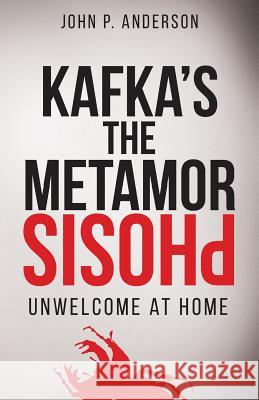Kafka's The Metamorphosis: Unwelcome at Home » książka
Kafka's The Metamorphosis: Unwelcome at Home
ISBN-13: 9781627340663 / Angielski / Miękka / 2016 / 218 str.
Fresh from the magic kingdom of Joyce's Finnegans Wake, this non-academic author ushers us line-by-line into the shadows of Kafka's spectral bug theater. He walks the bug back along hints left by Kafka as to what happened the night before, why that night was different from all other nights. In this reading, father Samsa betrayed his first-born and needy son Gregor by declaring him unwelcome at home, even though Gregor was paying the rent. Stimulated by this betrayal of blood by blood, the twilight zone opened momentarily allowing father's brutality to transform the son into a giant bug. Three months later, the combined protective forces of Easter and Passover are necessary to finally put the creature to rest: Easter for his spirit and Passover for his bug body. Using then-current formulas from psychoanalysis as to hysterical conversion and from psychodynamics as to the human energy system, this explanation locates in a story often found mysterious a coherent path to the lack of memory by Gregor of these events and the reason for his hard back and soft underbelly. As the author sees it, irony fuels the title because the metamorphosis changed Gregor's exterior but not his inner nature, his "indestructible" love for family, while just the opposite happened to his convenience-loving family. And irony fuels the results because father Samsa got just the lazy and dependent son he criticized Gregor for being in wanting to stay at home. The author traces how Kafka uses verb tense and aspect, psycho-narration, as well as changes in the narrator's voice to make meaning in this drama theater. In the last act and after Gregor is disposed of by a Mary Magdalene-suggesting charwoman, the parents prepare their last child, their daughter, for departure, which will leave them in complete convenience. For her they have saved a nest egg that will help supply a nest for her family eggs, a family nest denied to their first-born.
Fresh from the magic kingdom of Joyces Finnegans Wake, this non-academic author ushers us line-by-line into the shadows of Kafkas spectral bug theater. He walks the bug back along hints left by Kafka as to what happened the night before, why that night was different from all other nights. In this reading, father Samsa betrayed his first-born and needy son Gregor by declaring him unwelcome at home, even though Gregor was paying the rent. Stimulated by this betrayal of blood by blood, the twilight zone opened momentarily allowing fathers brutality to transform the son into a giant bug. Three months later, the combined protective forces of Easter and Passover are necessary to finally put the creature to rest: Easter for his spirit and Passover for his bug body.Using then-current formulas from psychoanalysis as to hysterical conversion and from psychodynamics as to the human energy system, this explanation locates in a story often found mysterious a coherent path to the lack of memory by Gregor of these events and the reason for his hard back and soft underbelly. As the author sees it, irony fuels the title because the metamorphosis changed Gregors exterior but not his inner nature, his "indestructible" love for family, while just the opposite happened to his convenience-loving family. And irony fuels the results because father Samsa got just the lazy and dependent son he criticized Gregor for being in wanting to stay at home.The author traces how Kafka uses verb tense and aspect, psycho-narration, as well as changes in the narrators voice to make meaning in this drama theater. In the last act and after Gregor is disposed of by a Mary Magdalene-suggesting charwoman, the parents prepare their last child, their daughter, for departure, which will leave them in complete convenience. For her they have saved a nest egg that will help supply a nest for her family eggs, a family nest denied to their first-born.











